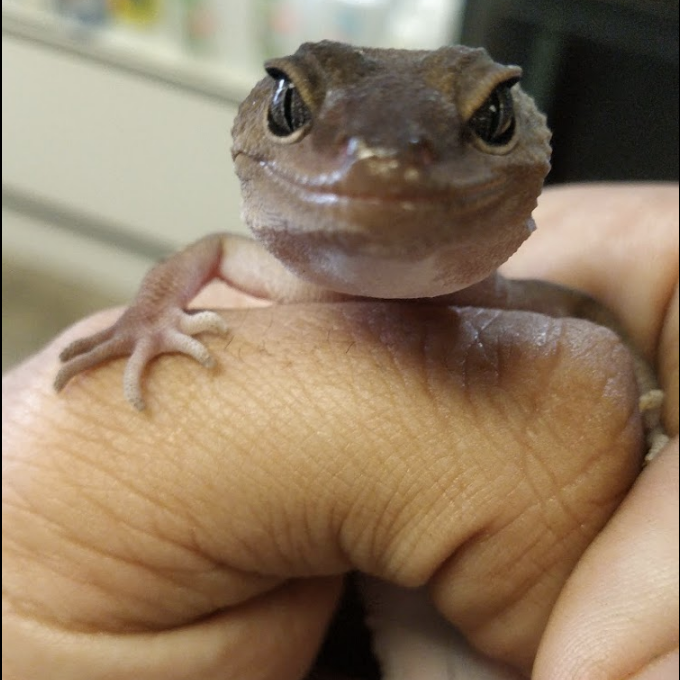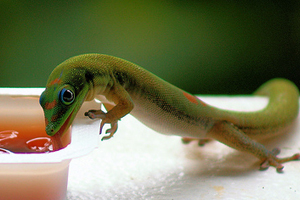BalloonBat
New Member
- Messages
- 2
HISTORY:
I adopted an adult leopard gecko from PetSmart two weeks ago because it was blind. Prior to this, the gecko lived in the store for maybe five months in a 10 gallon enclosure with an overhead heat lamp during the day and a night lamp at night. It was fed a diet of crickets until it began rejecting those, then it was fed giant mealworms because that was all it would eat. To my knowledge, it would eat 2-3 giant mealworms every second or third day, but it was offered food almost daily. The gecko was known to go longer without eating, but it was fairly healthy with a decently plump tail.
ENCLOSURE:
I placed the gecko in a 20 gallon tank with a warm and cool side and three respective hides (one of them being a humid hide in the middle with moist moss). The bottom is lined with paper towel. A low-lying water dish and calcium dish are provided at all times. The heating pad ranges from 90-94 degrees Farenheit and he spends most of his time there during the day and comes out at night to roam and drink water. She has shed once (yesterday) but has not gone inside her humid hide. I do not have a UVB lamp.
PROBLEM:
After I brought the gecko home, it at seven giant mealworms the next day (it had not eaten for four days prior) and rejected all the giant mealworms, regular mealworms, and large crickets I'd offer it until 10 days later when it accepted two large crickets. Two days later, I managed to feed it five waxworms and I wasn't able to feed it after that. The gecko has used the toilet regularly since being adopted, but mostly to pee since it doesn't eat. It is a very picky eater and because it can't see well, prefers slow-moving insects and none that can touch his face (unless she is nudging it purposely). She will not eat if there is too much movement in the tank and will immediately stop eating if the insect touches its face - she will try to leave the area very quickly.
-----------
I am at a loss for what to do. Besides not providing a timed UVB bulb, which I intended to supplement with D3 during some feedings, I feel like have provided a decent environment for the gecko to live in. It is placed in the warmest room in the house and I have barely handled it since I brought it home. However, I have held it three times - once the day after bringing it home, then the day after that, and then yesterday. She is very skittish and doesn't enjoy being scooped up, so I try to avoid making her anxious by not interacting with her. I can barely move when I go to feed her because the movement of the shadows or just me can startle her if she notices. It's not like she doesn't food because she has followed my finger in hopes of eating it before, so I don't know what her issue is. She has lost the nice bulge in her tail since coming home and it's more straight. At this point, I feel like I might have to force feed her liquid nutrients in order for her to survive, but I don't want to do that because I feel like that wouldn't be living. I am very tempted to give this gecko away to someone with more experience and money if they can get her to eat regularily.
If anyone has any advice, I would very much appreciate it. I don't want to give this gecko away, but if she's not happy with me then she would be better off going to someone who might know how to care for her better.
I adopted an adult leopard gecko from PetSmart two weeks ago because it was blind. Prior to this, the gecko lived in the store for maybe five months in a 10 gallon enclosure with an overhead heat lamp during the day and a night lamp at night. It was fed a diet of crickets until it began rejecting those, then it was fed giant mealworms because that was all it would eat. To my knowledge, it would eat 2-3 giant mealworms every second or third day, but it was offered food almost daily. The gecko was known to go longer without eating, but it was fairly healthy with a decently plump tail.
ENCLOSURE:
I placed the gecko in a 20 gallon tank with a warm and cool side and three respective hides (one of them being a humid hide in the middle with moist moss). The bottom is lined with paper towel. A low-lying water dish and calcium dish are provided at all times. The heating pad ranges from 90-94 degrees Farenheit and he spends most of his time there during the day and comes out at night to roam and drink water. She has shed once (yesterday) but has not gone inside her humid hide. I do not have a UVB lamp.
PROBLEM:
After I brought the gecko home, it at seven giant mealworms the next day (it had not eaten for four days prior) and rejected all the giant mealworms, regular mealworms, and large crickets I'd offer it until 10 days later when it accepted two large crickets. Two days later, I managed to feed it five waxworms and I wasn't able to feed it after that. The gecko has used the toilet regularly since being adopted, but mostly to pee since it doesn't eat. It is a very picky eater and because it can't see well, prefers slow-moving insects and none that can touch his face (unless she is nudging it purposely). She will not eat if there is too much movement in the tank and will immediately stop eating if the insect touches its face - she will try to leave the area very quickly.
-----------
I am at a loss for what to do. Besides not providing a timed UVB bulb, which I intended to supplement with D3 during some feedings, I feel like have provided a decent environment for the gecko to live in. It is placed in the warmest room in the house and I have barely handled it since I brought it home. However, I have held it three times - once the day after bringing it home, then the day after that, and then yesterday. She is very skittish and doesn't enjoy being scooped up, so I try to avoid making her anxious by not interacting with her. I can barely move when I go to feed her because the movement of the shadows or just me can startle her if she notices. It's not like she doesn't food because she has followed my finger in hopes of eating it before, so I don't know what her issue is. She has lost the nice bulge in her tail since coming home and it's more straight. At this point, I feel like I might have to force feed her liquid nutrients in order for her to survive, but I don't want to do that because I feel like that wouldn't be living. I am very tempted to give this gecko away to someone with more experience and money if they can get her to eat regularily.
If anyone has any advice, I would very much appreciate it. I don't want to give this gecko away, but if she's not happy with me then she would be better off going to someone who might know how to care for her better.


